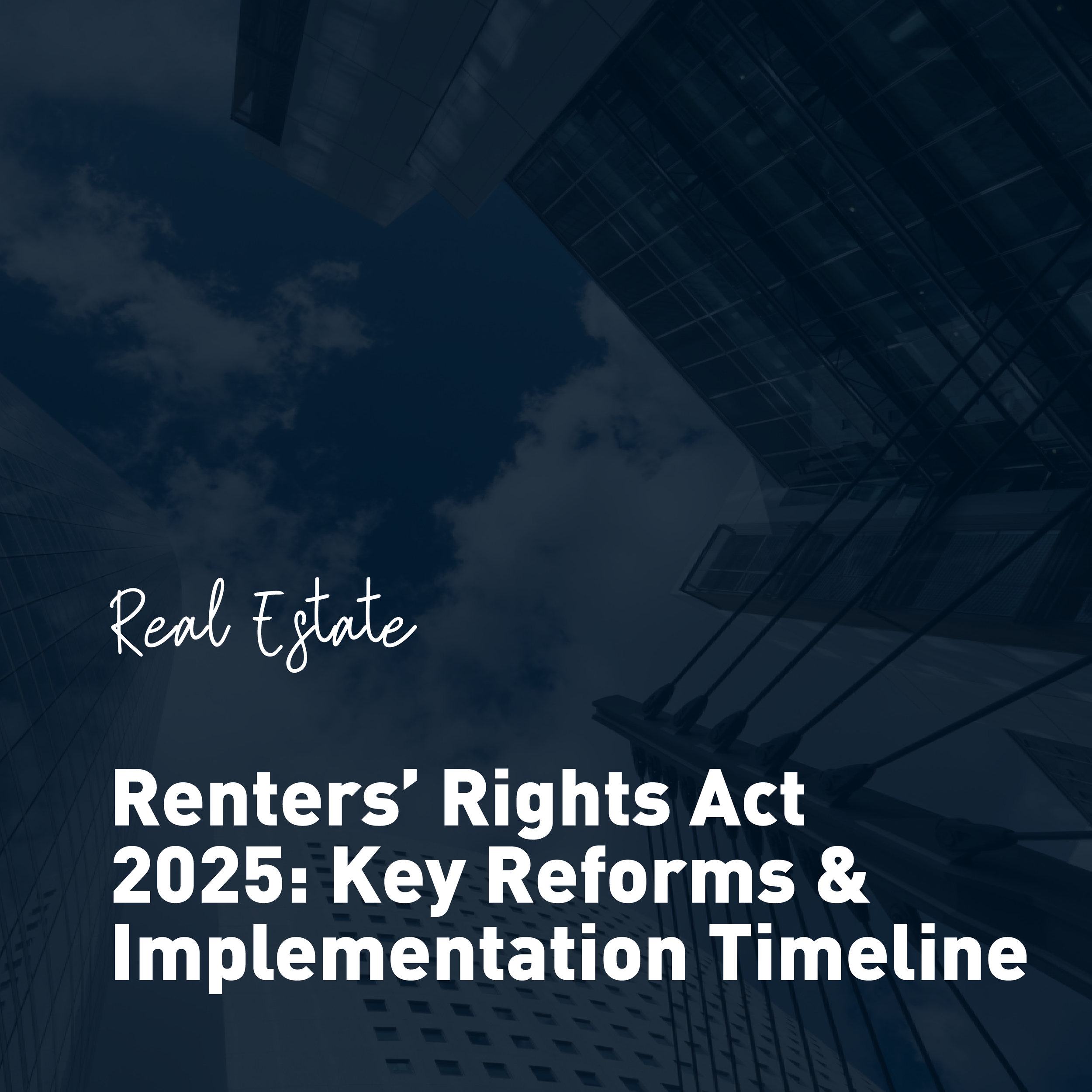Real Estate Investment & Finance | Commercial Property
Our experienced team is dedicated to delivering strategic, commercially focused legal advice to occupiers across all sectors of the real estate market. Whether you are expanding your business, relocating, managing a complex portfolio, or renegotiating lease terms, we provide clear, practical guidance every step of the way.
We advise on the full spectrum of landlord and tenant property services, including:
Site acquisition, leases and disposals
Agreements for lease
Lease negotiations and renewals
Surrenders and terminations
Rent reviews and service charge arrangements
Fitout, leasehold improvements and dilapidations
Assignments and underletting/sublettings
Security of tenure and statutory rights (e.g. under Landlord & Tenant Act regimes)
Dispute resolution (rent/service charge, dilapidations, repair liabilities)
We provide comprehensive legal advice to SMEs, chains, entrepreneurs and individuals in relation to all aspects of their real estate requirements. Whether entering new premises, restructuring existing estate, or exiting leases, we work hard to deliver pragmatic, commercially grounded solutions.
Related Expertise
Our Team
News & Insights
The English Devolution and Community Empowerment Bill (“the Bill”) was submitted to Parliament on 10th July 2025. While the Bill is largely geared towards the devolution of powers from Westminster to local authorities, Schedule 31 of the Bill introduces a surprise ban on Upwards Only Rent Review (“UORR”) clauses in commercial leases in England and Wales.
The Law Commission has issued an interim statementsetting out the provisional conclusions drawn from its first consultation paper on the future of security of tenure for business tenancies under Part II of the Landlord and Tenant Act 1954 (the 1954 Act).
The Renters’ Rights Bill (“RRB”) was introduced with an aim of providing “greater rights and protections to people renting their homes, including by abolishing section 21 ‘no fault’ evictions and reforming grounds of possession”.
Guarantees, warranties and indemnities are a means of allocating risk in commercial transactions and are often seen together (usually in a lease or security documents), but all carry very different obligations.
This County Court lease renewal case under Part 2 of the Landlord and Tenant Act 1954 (“LTA 1954”) relates to the tenant’s attempt to include a break clause in a renewal lease and is a notable application of the Court’s approach to determining renewal lease terms set out in the leading case of O'May v City of London Real Property Co Ltd [1983] AC 726 (“O’May”).
The Grenfell Tower Inquiry has, today, published its final phase of the report to examine the circumstances leading up to and surrounding the fire at Grenfell Tower on the night of 14 June 2017. The report highlights significant deficiencies in the current building safety regulations and is likely to have a major impact on the construction industry, manufacturers and property owners.
The Leasehold and Freehold Reform Act 2024 (“the Act”) introduces several significant changes affecting enfranchisement, making it easier and more cost-effective for residential leaseholders to extend their leases or purchase the freehold of their properties. The key impacts on enfranchisement are set out in this article.
A Laytons’ team of real estate lawyers will be in Cannes during MIPIM from 12-15 March 2024. Please use the form to contact us if you would like to arrange a meeting in Cannes during these dates.
A flying freehold has no relationship to a flying fortress (a US Boeing engined heavy bomber developed in the 1930’s) but is an English legal term to describe a freehold which overhangs (or underlies) another freehold. There is a counterpart situation known as a creeping freehold, for example, a basement or cellar belonging to one freehold underlies a different freehold at ground level.
We are pleased to share that Honey Dave has been appointed the Head of the India Desk at Laytons ETL.
The Renters’ Rights Act 2025, which received Royal Assent on 27 October 2025 and will take effect from 1 May 2026, represents the most significant reform to the private rental sector since the Housing Act 1988. The Act aims to deliver long-overdue changes, giving tenants greater security and freedom to leave substandard properties, and raising standards across the board.
London is still considered the world’s pre-eminent financial centre, and is one of the most attractive international cities for foreign investment. One of the reasons for this is the high regard that the international business community has for the principles of the English legal system and the fairness of the English Courts.
We understand that dealing with your family affairs requires more than just sound advice and technical excellence. We invest the time to get to know our clients’ circumstances, needs and preferences to deliver commercially informed and practical results for you.
In an attempt to crackdown on foreign criminals using property to launder money, the UK government has, for a number of years, attempted to introduce a register of those overseas entities which hold UK property.
A receiver is an individual (or those acting jointly) appointed by a creditor that holds a charge over the assets of a debtor to take custody of the charged assets, manage those assets and receive the income from them. Usually, a receiver will also have the power to sell the assets and to apply the proceeds of sale in satisfaction of the secured debt.
In May 2019, the Court of Appeal upheld the 2018 High Court decision to quash a local authority’s registration of land as a town or village green. The Court of Appeal held that the adopted core strategy policies of the local authority gave rise to a trigger event that precluded the local authority from registering the land as a town or village green.
Usually a ransom strip is a strip of land lying between an adopted highway with public rights of way and a property or land and where crossing that land or laying services beneath that land could represent a trespass on the part of the owner of the property cut off from the Highway by the ransom strip.
Freehold land typically encompasses all the land below and above it (divided vertically), which in practice means that standard freeholds do not cross or overlap. A flying freehold is a freehold property which overhangs or projects (flies) above or below an adjoining freehold property.
We have lived with the NPPF since 2012. Generally welcomed by the development industry, will the changes to the NPPF, now embodied in the 2018 framework, going to make a material difference in addressing housing delivery problems?
This update comments on the latest developments including the shortening of filing and payment window to 14 days from the effective date, what is a “major interest”?, bare trusts and first time buyer’s relief and the Supreme Court decision in Project Blue.







































![Wiltshire Council v Cooper Estates Strategic Land Ltd [2019] EWCA Civ 840](https://images.squarespace-cdn.com/content/v1/570665c1d51cd45f7c8f1812/1561112735294-NYDMG9BDA4J6GDTJQBF3/Wiltshire+Council+v+Cooper+Estates+Strategic+Land+Ltd.png)



